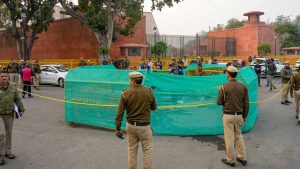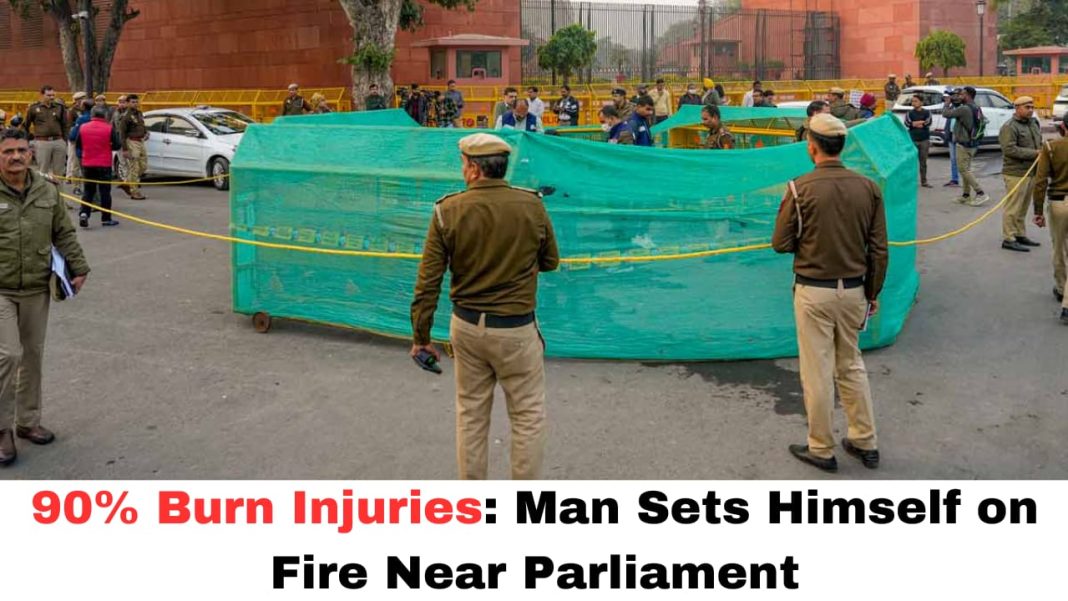Digital News Guru New Delhi Desk:
Man sets himself on fire near parliament, sustains 90% burn injuries
On December 25, 2024, a man identified as Jitendra, from Baghpat in Uttar Pradesh, attempted self-immolation near the Indian Parliament in New Delhi. The incident occurred at the Rail Bhawan roundabout, a high-security area adjacent to the Parliament building.
Incident Details
Jitendra reportedly set himself ablaze using a petrol-like substance in a park opposite the Parliament. Eyewitnesses observed him igniting himself and then running towards the main gate of the Parliament complex.

Security personnel and local police acted swiftly to extinguish the flames and transported him to Dr. Ram Manohar Lohia (RML) Hospital. Reports indicate that he sustained 90% burn injuries and is in critical condition.
Possible Motive
Preliminary investigations suggest that Jitendra’s actions may be linked to personal issues stemming from a legal case filed against him in Baghpat. Authorities have not discovered a suicide note at the scene, and the exact motive remains under investigation. Delhi Police Deputy Commissioner Devesh Mahla stated, “In an investigation, we have found that he is a resident of UP’s Baghpat and that he is in some trouble due to a case registered against him in Baghpat.”
Security and Public Reaction
The incident has raised concerns about security measures in the vicinity of the Parliament, especially considering the high-profile nature of the area. Authorities are reviewing security protocols to prevent similar occurrences in the future.

Public reactions have been mixed, with some expressing sympathy for Jitendra’s plight, while others emphasize the need for addressing mental health issues and providing support to individuals facing personal crises.
Historical Context of Self-Immolation
Self-immolation has been employed historically as a form of protest or expression of extreme distress. In India, such acts have been associated with various social and political movements. For instance, during the Telangana movement, several individuals resorted to self-immolation to demand statehood. Globally, self-immolation has been used as a method of protest, notably by Tibetan activists and during the Arab Spring.
Mental Health Considerations
This incident underscores the critical importance of mental health awareness and support systems. Individuals experiencing severe distress or facing legal and personal challenges should have access to counseling and mental health services. Public health officials advocate for increased mental health resources and destigmatization of seeking help to prevent such tragic incidents.
Legal and Ethical Implications
From a legal perspective, attempted suicide was decriminalized in India with the enactment of the Mental Healthcare Act, 2017. The Act recognizes that individuals attempting suicide are under severe stress and should not be punished but rather provided with care and rehabilitation. Ethically, this approach aligns with the need for compassionate treatment of individuals in crisis.

Conclusion
Jitendra’s self-immolation attempt near the Indian Parliament serves as a stark reminder of the complexities surrounding mental health, personal crises, and the lengths to which individuals may go when in distress. It highlights the necessity for robust support systems, timely intervention, and public awareness to address the underlying issues that lead to such desperate actions. As authorities continue their investigation, it is imperative to focus on preventive measures and support mechanisms to avert similar incidents in the future.
You May Also Read: Good Governance Day 2024: Honoring Atal Bihari Vajpayee’s 100th Birth Anniversary








